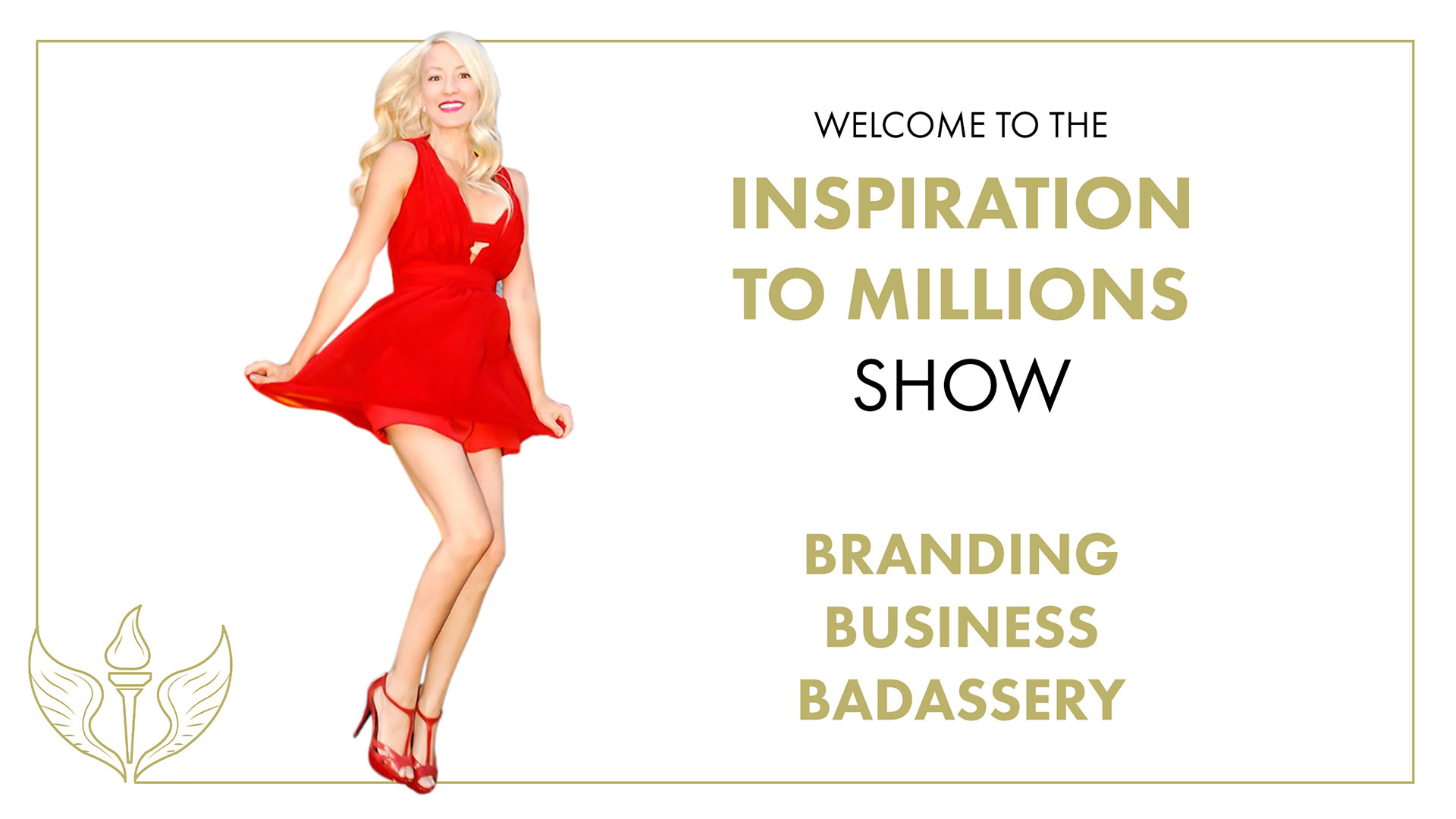Today, we are answering the question on every entrepreneur’s mind: How do I turn my creativity into revenue? And you know, because of the way the value of art and creativity gets downplayed in society, you may be asking yourself “Should I even try to turn my creativity into revenue?”
Right? Like, do I even bother? Because the message society sends about art and creativity is that the odds of being successful are stacked against you. Creatives are socially conditioned in a lot of ways to undermine the value of their talents. Choose to go to law school, and society says, “How impressive! Your family must be so proud!” But choose to go to an art academy and the conversation becomes, “Oh, well good luck with that.”
And it’s crazy! Because look—historically, art is the BEST investment because it retains its value. Art is the keeper of our culture. It serves as a universal language that is unrestricted by verbal barriers. Art connects people by revealing our similarities. Art helps us understand each other better by conveying the beauty of our differences. Art is a cultural un-divider, and it always has been.
Today, in this century—technology has replaced literally thousands of vocations. But have you noticed that bots can’t quite replace the need for creativity in marketing, in networking, in entertainment…any creative industry, in cooking, in quilting, in font design, in architecture— and not for a lack of trying. The bots are being built, okay? And the general message being sent to the world right now is, “If a bot can do what you do—you better get better, or get out!”
You know what I say? Bots have their place. Let them do what they can. They operate on the premises of proven formulas and repetition, but they don’t evolve the way an artist evolves. They only take the boring jobs, so let them.
Picasso once said, “It took me 4 years to learn to paint like Raphael, and a lifetime to learn how to paint like a child.”
As artists, we learn the rules so we can masterfully break them.
Bots will never evolve to being able to break the rules like an artist. They operate only within the parameters of proven formulas, tricks of the trade. For an artist, proven formulas have their place: To educate you enough to break all the rules. Artists learn the tricks to make the magic.
I didn’t go to law school or study any other kind of traditional business vocation in college. My degree is in poetry. And I’ll tell you something when I switched from International Business and World Trade to poetry. I got a lot of shade. Oh, I heard it all: “Do you want to live the life of a starving artist?” “You’ll never make money at it, you’ll live broke.” Or my favorite, the most common one, the one that lit a fire under my butt was: “Oh that’s sweet, it will be a nice thing to share with your kids when you settle down and get married.”
I used that degree to become a successful namer, and for over 25 years now, I’ve been naming products and services that you probably see and use every day. I’ve had different celebrities show me pics on their cell phone of them dressed up as a product I’ve named. One time at a conference I had one of the people in the book/movie The Secret called a friend crying because he just met the namer of Flipz pretzels and he and his best friend had bonded over a long night of Flipz Pretzels and philosophic ponderings…that was pretty wild. I even found myself in a prime minister’s quarters discussing the possibility of rebranding a country. If that isn’t International Business and World Trade tied to Poetry what is? And it’s something I could have never imagined when I was making that leap to follow my dream. It certainly wasn’t the traditional path for becoming a successful business owner, but I’m a Creative, like you! I found a professional way to apply my talents, and you can, too. Also, it’s a BLAST! It’s literally a great reason to wake up every morning.
For this article, I want to share with you one of the 3 Things You Need to Do to Confidently Turn Your Creativity Into Revenue. To hear more about all three ways to turn your creativity into revenue, I highly recommend you watch the full episode!
Number One: Know the Value of Your Creativity.
And when I say value—I’m talking about monetary value, emotional value, AND time-saving value.
Artists are infamous for selling their creative talents short, and part of the reason is the cultural conditioning we talked about a second ago. Many of us conform to labeling our artistic abilities as hobbies, and as hobbyists—many of us grew accustomed to handing out our talents for free, often hearing our friends say things like, “people would pay money for this,” or “you should consider selling these…” to which many of us have replied, “Oh, I do this for fun, I wouldn’t even know what to charge.”
Well, then FIGURE IT OUT. And don’t sell yourself short. Your artistic talents are not only entirely unique, they also create revenue for others, they save people time, they create emotional connections that lead to brand loyalty…
The decision to buy is emotional. Anytime you make an artistic contribution to someone else’s business, you are making them more money. Art is brimming with value.
Right now, millions of people are looking for artistic shortcuts. They are downloading apps to do the creative work for them. They are looking for templates to help them recreate the magic of someone else’s artistic genius. They are searching the internet for stock photos that might appeal to their customers.
Actually speaking of stock photos, have you ever heard of Unsplash? Here’s a perfect example of how creativity was the path less chosen but wound up making all the difference:
Unsplash is a wildly successful company that started out as a Tumblr blog by a man named Mikael Cho. At the time, Cho was the CEO of a failing start-up called Crew, an online platform that was out of money and about to go under. As he prepared himself for the demise of Crew, Cho made a random decision to start a Tumblr blog that offered ten free, professional-grade photos. Harboring the same disdain and frustration that many of us have about cheesy, expensive stock photos—Cho figured that the few customers Crew did have might be able to use them in the future, so he just threw them out there as a courtesy, expecting nothing in return.
Four hours and $19 later, Unsplash was born. One month later, Unsplash had 20,000 email subscribers and had the attention of Forbes and Fast Company. Forbes even became an Unsplash user, backlinking readers to Unsplash, and generating mass relevance.
Unsplash was even able to refer enough customers over to Crew to help his failing start-up to secure 10.6 million in funding—effectively saving Crew from disaster.
And as recently as March of this year (2021), Unsplash was acquired by Getty Images for a currently undisclosed amount! And having founded some of the most famous museums in the world, the Getty family absolutely knows the value of art.
Do your research. Know what the current market rate is for the creative products or services you have to offer. Get to know your ideal audience, read their reviews, make note of their common complaints, and brainstorm ways to provide them with a superior experience. Research how much money your creativity stands to generate for others, and factor in how much time you’ll save them. Make a list of all the things your competitors have in common and identify what makes you different. Know EXACTLY what it is you are offering. In short, take your talents seriously, they are investments you’ve made and they are excited to be put in the game, coach. You are truly the only one who is holding them back. Take a leap like Unsplash did, like every creator before you did. No one created anything without fear of rejection and failure. Ever. No one ever has, it’s human to feel that, but it’s also human to know that you can say, “I’m doing it anyway. I’m pursuing my dream, not pushing it down so it can fester and explode into self doubts and loss of confidence.”
Because for Unsplash it wasn’t just a free stock photo, was it? No. It was a high-quality marketing tool that saved businesses time, money, and went on to inspire their customers to invest their time and money with those businesses. Art evokes emotion, and emotion creates connections; creativity is the building block for establishing relationships. One of the things that makes art so important is that once it’s released into the world, it belongs to everyone, and it can mean a million different things to a million different people. Consider this, without creativity, there is nothing to inspire brand loyalty. Brand Loyalty is literally the business plan of every single business in existence.
You are an original, and what you have to offer creatively has the potential to create value upon value because no matter what business you are in, brand loyalty is your business plan.
Thank you so much for joining me today! Be sure to watch the full episode to learn more about turning your creative talents into revenue, and to receive an exclusive link to RSVP to my upcoming webinar. It’s perfect for you. I made it that way—to be specifically for Entrepreneurs who are just beginning to build their brand. It has been such a pleasure speaking to fellow creatives about how to take your artistic talents and transform them into the kind of revenue that supports you not only financially, but in your ability to Love What You Do, and Love How You Do It.

